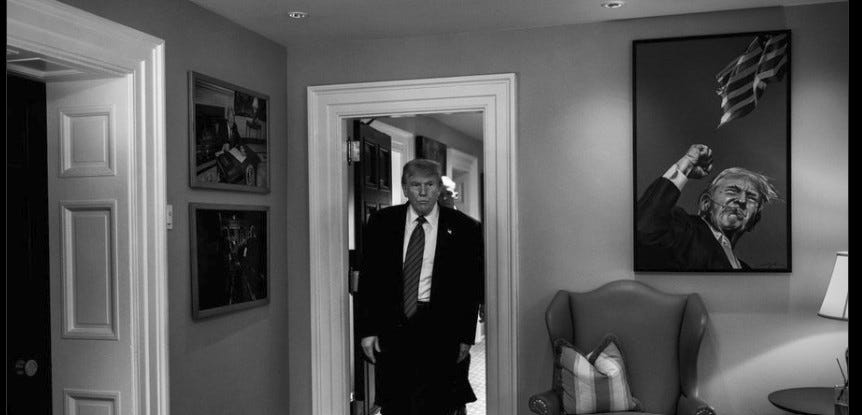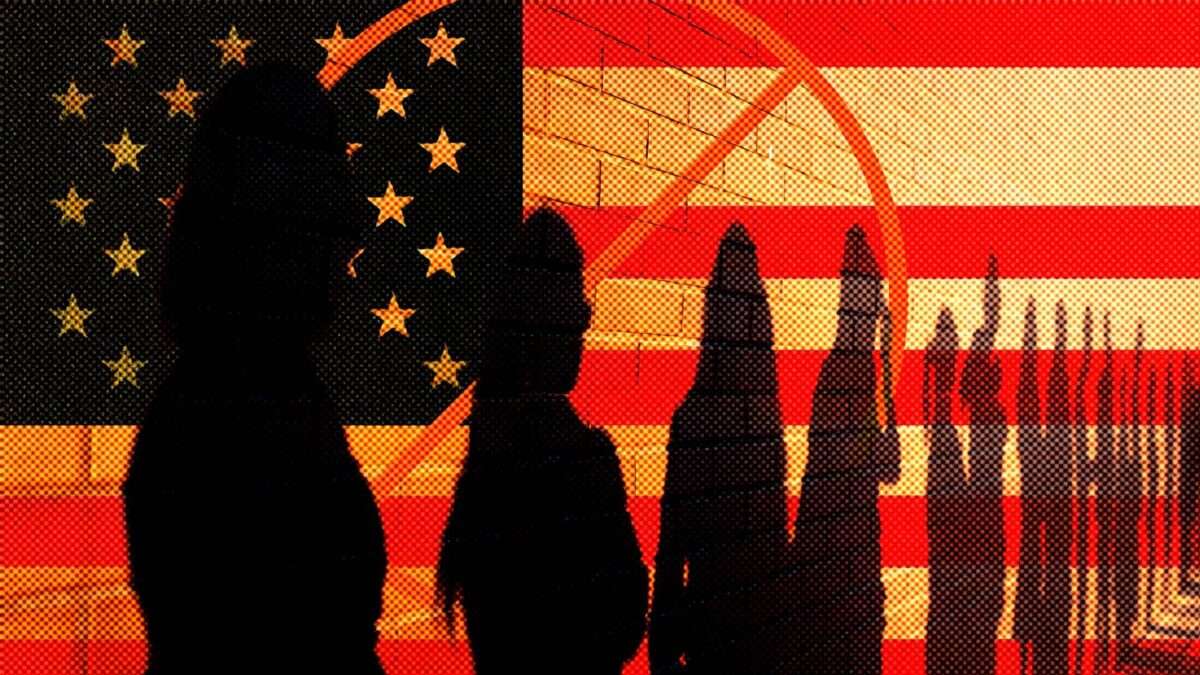Boycotting foreign countries is an American tradition older than the United States. The Boston Tea Party that preceded the American Revolution came at the tail end of a boycott campaign against British goods. But since the 1970s, the U.S. government has tried to stop Americans from participating in unauthorized foreign boycotts.
This week, the House of Representatives was set to vote on the International Governmental Organization (IGO) Anti-Boycott Act, which would arguably be the most draconian measure of this kind to date: It would impose a maximum 20-year prison sentence or $1 million fine for complying with international human rights sanctions against a U.S. ally, including by "furnishing information."
The bill's sponsors are bipartisan: Reps. Mike Lawler (R–N.Y.) and Josh Gottheimer (D–N.J.). So are its opponents. After running into unexpected Republican opposition—including from lawmakers who vehemently oppose boycotting Israel, such as Reps. Marjorie Taylor Greene (R–Ga.) and Anna Paulina Luna (R–Fla.)—the vote was quietly postponed, the libertarian-leaning Rep. Thomas Massie (R–Ky.) revealed on X on Sunday night.
Although the bill is on ice for now, the antiboycott laws that it is built on are still on the books.
In response to the Arab League embargo on Israel, the Carter administration adopted export regulations in 1977 banning American businesses from heeding an "agreement with, a requirement of, or a request from" a foreign government to boycott a "friendly" third party. Congress tightened the restrictions in 2018, imposing a maximum 20-year prison sentence or $1 million fine for violations. Complying with a boycott includes "furnishing information" to boycotting countries, or even failing to report a foreign boycott request to the U.S. Bureau of Industry and Security. Last year, an American company was fined $151,875 after it didn't tell the U.S. government that its distributor in the United Arab Emirates wanted it to stop selling to Israel.
The IGO Anti-Boycott Act would expand unauthorized boycotts to include campaigns by international institutions like the United Nations or European Union. The preamble to an earlier Democratic-sponsored version of the bill, which failed in 2018, specifically accused the United Nations Human Rights Council of sponsoring a "commercial boycott" of Israel by publishing a list of businesses that it considered complicit in Israeli rule over the Palestinian territories.
"International organizations can't get away with targeting our key democratic ally, Israel. That's why we are introducing the bipartisan IGO Anti-Boycott Act to counter the blatant anti-Israel bias in international organizations like the United Nations," Gottheimer said in a January press release published by Lawler's office.
Civil libertarians warn that treating the U.N. list as a foreign boycott would allow the U.S. government to prosecute Americans for political statements. The IGO Anti-Boycott Act "plainly extends to voluntary, politically-motivated speech seeking to support proscribed boycotts," the American Civil Liberties Union (ACLU) argued in a February 2024 letter to lawmakers.
Although the U.N. resolution creating the list in 2016 does not specifically call for a boycott, it does urge nations to hold listed companies, such as Israeli security and surveillance contractors, responsible for violating Palestinians' rights. When the list was publicized in 2020, Israeli Foreign Minister Israel Katz called it a "discriminatory anti-Israeli policy" and a "shameful capitulation to pressure from countries and organisations that are interested in hurting Israel." Prime Minister Benjamin Netanyahu promised to "fight this with all our strength."
An Israeli government strategy memo, written in February 2019 and revealed by the group Distributed Denial of Secrets in July 2024, recommends trying to get the U.N. list covered by "existing U.S. antiboycott regulations imposed by the Commerce and Treasury Departments," which "could be leveraged to limit the ability of any person subject to the U.S. rules…to undertake any [U.N.] Database-related activity."
The memo continued: "The challenge is that, historically, both the Commerce and the Treasury Departments have taken a position that their regulations apply only to boycotts that are enforced by governments. They therefore have not applied those regulations to actions taken individually by companies to comply with non-governmental boycotts." It added that "new Congressional legislation" would be the "most difficult approach, but the one that would provide the most flexibility to implement new authorities."
Lawler and Gottheimer's bill would do just that. Although it passed the House last year, that effort died in the Senate. Lawler and Gottheimer expected that a second attempt would be more successful now that Republicans control both houses of Congress, according to their January 2025 statement, filled with supportive quotes from Christians United for Israel, the American Israel Public Affairs Committee, the Republican Jewish Committee, and the Foundation for Defense of Democracies.
What they didn't take into account was how much Republican opposition they would run into within the House itself. "Americans have the right to boycott, and penalizing this risks free speech. I reject and vehemently condemn antisemitism but I cannot violate the first amendment," Luna wrote on X. Massie called it "a ridiculous bill that our leadership should have never scheduled for a vote."
It's unclear if or when the bill will be brought up again. In the meantime, plenty of anti-boycott laws are already on the books. In addition to the federal antiboycott laws, at least 38 states have passed laws, executive orders, or resolutions targeting boycotts of Israel.
In 2019, the Arkansas Times sued the state over a requirement that it sign an anti-boycott certification to continue doing business with the state university system. The 8th Circuit upheld the law, stating that "purely commercial, non-expressive conduct" was not protected speech. Foundation for Individual Rights and Expression senior attorney Jay Diaz has argued that this was the wrong decision, citing "a long U.S. tradition" of political boycotts, from the Boston Tea Party to the Civil Rights Movement.
And the right to boycott is not the only First Amendment issue at play. The ban against "furnishing information" to foreign boycotters is already extremely broad. The law firm Watson Farley & Williams lists a company's certification "that they have not violated or will not violate the sanctions law of any country, without referring specifically to Israel or the Arab League Boycott," as a potential violation.
Davis Wright Tremaine LLP mentions "a shipping certificate to an intermediate consignee in a third country certifying that a shipping vessel is allowed to call at Arabian ports" as another potential violation, because it implies "information about the vessel owner's business relationships—or lack thereof—with Israel."
Adding international human rights investigations to the antiboycott law would create a whole new legal minefield—and more opportunities to arrest or fine Americans, as the ACLU warned in its letter. After all, Israel isn't the only U.S. partner on the U.N. or E.U. radar for allegations of bad conduct.
"While Congress has every right to oppose boycotts fostered or imposed by international governmental organizations, such opposition is not a sufficient ground to ban Americans from communicating accurate factual information to an international governmental body, nor may Congress obstruct Americans from exercising their own freedom to express their political beliefs in the form of a boycott," the ACLU wrote.
The post Should Sharing Information About Israeli Businesses Get You 20 Years in Prison? appeared first on Reason.com.













 Bengali (Bangladesh) ·
Bengali (Bangladesh) ·  English (United States) ·
English (United States) ·